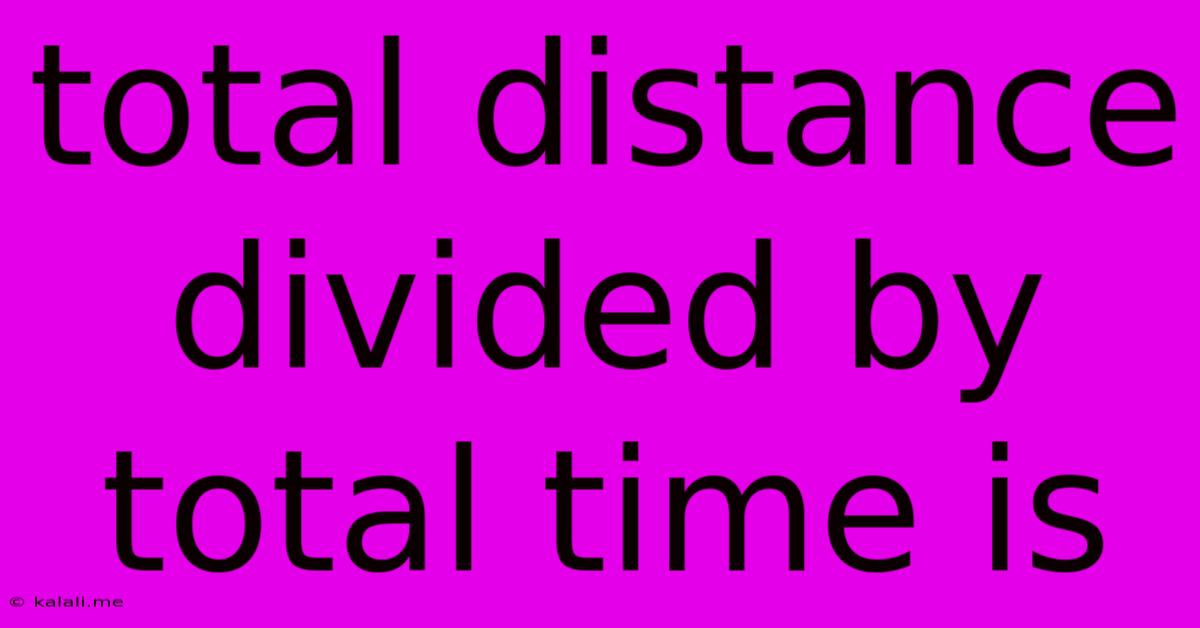Total Distance Divided By Total Time Is
Kalali
May 09, 2025 · 3 min read

Table of Contents
Total Distance Divided by Total Time Is: Understanding Average Speed
The calculation of total distance divided by total time is a fundamental concept in physics and everyday life. It represents average speed, a crucial measure for understanding how fast something is moving over a given period. This article will delve into the concept of average speed, exploring its definition, calculation, and applications. We'll also look at its difference from instantaneous speed and how to handle scenarios involving different speeds over varying distances.
Understanding average speed is vital for planning journeys, analyzing movement, and solving physics problems. It's a simple yet powerful tool for understanding motion.
Defining Average Speed
Average speed is the total distance traveled divided by the total time taken. It provides a single value representing the overall rate of movement, irrespective of variations in speed during the journey. For example, if you drive 100 miles in 2 hours, your average speed is 50 miles per hour (mph). This doesn't necessarily mean you were driving at a constant 50 mph for the whole journey; you might have driven faster at some points and slower at others.
Formula:
Average Speed = Total Distance / Total Time
The units for average speed will depend on the units of distance and time. Common units include meters per second (m/s), kilometers per hour (km/h), and miles per hour (mph).
Calculating Average Speed: Examples
Let's illustrate average speed calculations with a few examples:
-
Example 1: A cyclist travels 30 kilometers in 1.5 hours. What is their average speed?
Average Speed = 30 km / 1.5 hours = 20 km/h
-
Example 2: A car covers 150 miles in 3 hours. What is its average speed?
Average Speed = 150 miles / 3 hours = 50 mph
-
Example 3: A train travels 200 meters in 20 seconds. What is its average speed?
Average Speed = 200 meters / 20 seconds = 10 m/s
Average Speed vs. Instantaneous Speed
It's crucial to distinguish between average speed and instantaneous speed. Instantaneous speed is the speed at a specific moment in time. Think of the speedometer in your car – it displays instantaneous speed. Average speed, on the other hand, considers the entire duration of the journey.
For instance, a car might have an average speed of 60 mph over a 1-hour journey, but its instantaneous speed could have varied significantly throughout that hour – perhaps reaching 70 mph at certain points and slowing down to 40 mph at others.
Handling Multiple Speeds and Distances
When calculating average speed over a journey with varying speeds, we need to consider the distance traveled at each speed. The process involves calculating the total distance and the total time separately, before applying the average speed formula.
Example 4: A car travels 60 km at 60 km/h and then another 60 km at 30 km/h. What's the average speed for the entire journey?
- Time taken for the first leg: 60 km / 60 km/h = 1 hour
- Time taken for the second leg: 60 km / 30 km/h = 2 hours
- Total distance: 60 km + 60 km = 120 km
- Total time: 1 hour + 2 hours = 3 hours
- Average speed: 120 km / 3 hours = 40 km/h
Applications of Average Speed
Understanding and calculating average speed has numerous applications in various fields, including:
- Transportation: Planning travel times, optimizing routes, and estimating fuel consumption.
- Physics: Analyzing motion, solving problems involving displacement, velocity, and acceleration.
- Sports: Calculating the average speed of athletes, analyzing performance, and strategizing races.
- Meteorology: Tracking the movement of weather systems and predicting their arrival times.
In conclusion, while seemingly simple, the concept of total distance divided by total time, resulting in average speed, is a cornerstone of understanding motion and has widespread practical applications. Understanding its calculation and differentiating it from instantaneous speed is crucial for accurate analysis in various contexts.
Latest Posts
Latest Posts
-
Jaguar Adaptations In The Tropical Rainforest
May 10, 2025
-
How To Find Average Velocity From Velocity Time Graph
May 10, 2025
-
What Is Non Living Things In The Ecosystem
May 10, 2025
-
How Many Fl Oz In 6 Cups
May 10, 2025
-
What Is 1 Percent Of 5000
May 10, 2025
Related Post
Thank you for visiting our website which covers about Total Distance Divided By Total Time Is . We hope the information provided has been useful to you. Feel free to contact us if you have any questions or need further assistance. See you next time and don't miss to bookmark.